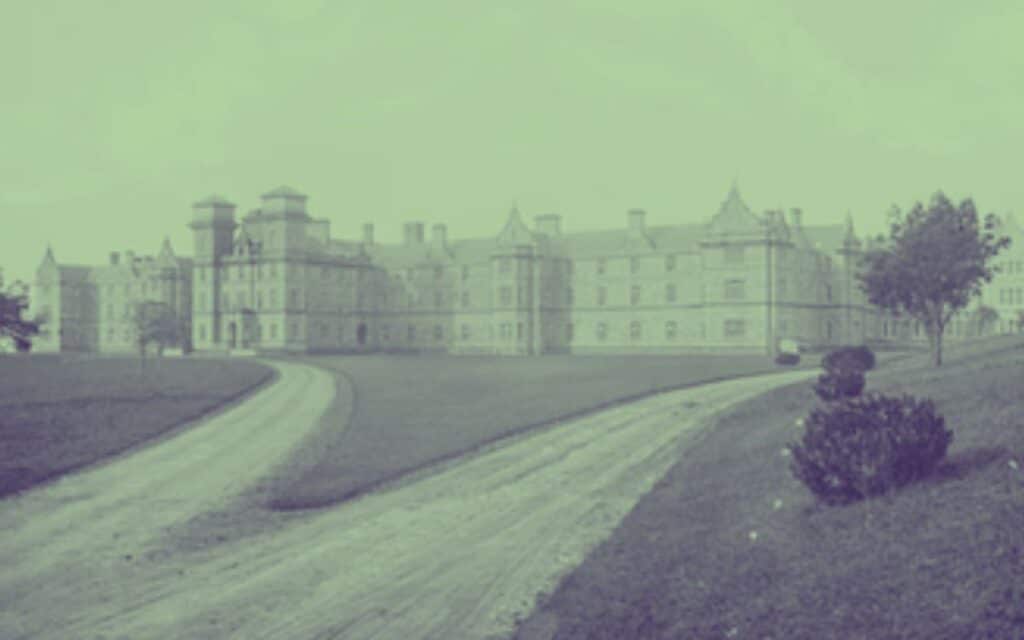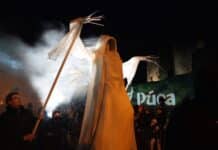Ireland is known for its lush landscapes, rich history, and lively culture, but it also has a darker side when it comes to historical medical care, steeped in mystery, tragedy, and the supernatural. ANN MASSEY McELROY tells us of 10 of the darkest haunted asylums and hospitals of Ireland.

Scattered across the country are crumbling hospitals and asylums that once housed the sick, destitute and forgotten, now standing as eerie reminders of a haunting past.
While the buildings seem empty, some in ruins, some of the patients have simply never left…
St Brendan’s Psychiatric Hospital
Grangegorman, Dublin
Once the largest mental asylum in Ireland, St Brendan’s in Dublin is infamous for its horrifically overcrowded conditions and controversial treatment methods.
Opened in the early 19th century, it housed thousands of patients over the years, which continued until 2013.
In 1997 two outpatients of the hospital were staying in a nearby halfway house owned by the authority. They were brutally murdered in what has become known as the Grangegorman Killings. The house has since been razed to the ground and is now an empty plot of land.
It is now the Phoenix Mental Health Centre. Reutilising a former place of mental anguish for similar reasons appears to have invoked dark energies within. Callers to the location report eerie sounds of moaning, disembodied whispers, and fleeting shadows, particularly in the parts of the old hospital not yet redeveloped.
Our Lady’s Hospital
Ennis, County Clare
Our Lady’s Hospital, also known as Ennis Asylum, is said to be haunted by the souls of former patients who endured painful, experimental tactics and isolation. The building, now in ruins, is the source of ghost sightings, cold spots, and phantom footsteps.
Locals describe anguished cries echoing through the night and several paranormal investigators have claimed to have witnessed lots of activity, including the spirit of a young boy at the window.
Cork District Lunatic Asylum/Our Lady’s Hospital
Cork City
Built in 1798, Cork District Lunatic Asylum, later known as St Kevin’s, was notorious for its harsh conditions. With over 2,000 patients at its peak, it witnessed a great deal of suffering and death. Overcrowding, disease and shocking conditions led to premature death as well as much suicide – corpses whisked away through dark corridors in the dead of night.
The decrepit halls were believed to be haunted by the committed and sobbing nurses. Many have reported sightings of ghostly figures and disturbing noises emanating from its ruins. Much of the asylum has since been redeveloped into residential apartments, although owners may find themselves with eternal sitting tenants…
Letterkenny District Asylum/St Conal’s Hospital
County Donegal
Opened in 1866, Letterkenny Asylum housed patients for over a century. Like many institutions of its time, overcapacity and underfunding led to deplorable conditions. Like something out of a Victorian period horror film, leaky pipes and dark corridors melded with the screams and moans of inpatients.
Many of the patients of more recent times and family visitors of the afflicted tell of the awful lives endured within the walls. The not so fortunate were buried in unmarked graves in Leck cemetery when the disposal site the authorities had favoured was closed off.
Paranormal investigators claim the building is home to restless spirits, with reports of strange lights, inexplicable sounds, and shadow figures lurking in the corners of the abandoned corridors.
St Ita’s Hospital
Portrane, County Dublin
St Ita’s, a psychiatric hospital that dates back to 1896, remains partially operational but is known for its haunted past. Typical of the stark Victorian institute architecture and overlooking the often bleak and grey Irish Sea, it appears the exterior reflected the bleakness of the patients within.
The location is personal to Ann Massey McElroy, who, on reaching the gates some years ago, was overwhelmed with a dark and nasty energy, refusing to go any further into the complex. This was long before she had realised others were having paranormal experiences in the building.
Visitors have reported ghost sightings, particularly of a spectral nun wandering the grounds at night. Many believe the spirits of former patients roam the halls, unable to move on from the traumas they experienced.
Connacht District Lunatic Asylum/St Brigid’s Hospital
Ballinasloe, County Galway
Opened in 1833, the Connacht District Lunatic Asylum is one of the oldest psychiatric institutions in Ireland. Originally set up as a rehabilitation asylum for ‘curable lunatics,’ it was known for regularly breaching capacity limits to double and dingy, unsanitary conditions.
The asylum closed its doors in the late 20th century, but paranormal activity continues to be reported. Witnesses claim to hear the voices of patients of the past and see apparitions wandering the derelict buildings.
Investigators were particularly disturbed to have found an empty coffin in the basement – perhaps not as disturbed as they would have been had it been occupied!
St Davnet’s Hospital
Monaghan, County Monaghan
St Davnet’s was built in the mid-19th century and served as a mental hospital for over a hundred years. Originally opened as the Cavan and Monaghan Lunatic Asylum, it was the largest institution of its time. Unusually, it was more of a success story with conditions of a more civilised nature and it continues in use today.
That said, the hospital is also reputed to be haunted by patients of the past. There have been numerous reports of disembodied voices, flickering lights, and objects moving on their own.
St Columba’s Mental Hospital
Sligo, County Sligo
St Columba’s Mental Hospital, which opened in 1855, housed patients under a new regime of less restraining and more freedom to roam the grounds. This did not however, removing the restraints of the mind were far more difficult and isolation and suicide were rife.
The location was subsequently converted into a hotel and is currently the Clayton Hotel, Sligo. Many who visit report hearing strange sounds, feeling ice cold, and seeing ghostly figures move through the shadows. One guest reported the hotel room door being propped open and whistling in the empty corridor.
Clonmel Mental Hospital
Clonmel, County Tipperary
Clonmel Mental Hospital, also known as St Luke’s, opened in the early 19th century and served as a psychiatric institution for many years. A health department report from the 1950s described ‘lines of naked people, faeces covering the floors, food served up with pitchforks, people deliberately kept in a state of animal-like existence.’
Finally closed amid damning reports, the hospital has since gained a reputation for paranormal activity, with numerous reports of apparitions, eerie sounds, and ghostly encounters. The spirits of former residents are said to still haunt the premises, especially in the now-abandoned sections of the hospital, where many experienced unimaginable suffering.
St Loman’s Hospital
Mullingar, County Westmeath
St Loman’s Hospital, originally known as the Mullingar Lunatic Asylum, opened in 1855 and operated for over a century, housing thousands of patients in often harsh conditions, with many not believing they should have been committed in the first place.
One such resident was 32 year old Julia Caffrey Leonard. The Housekeeper poured hot tea over her husband after confronting him about suspected adultery. This act had her committed as mentally incapacitated and here she remained for 22 years, death her only release in 1919. Every day she cried out for her freedom, protesting she should not be kept here. She was not alone in her anguish. The institution finally closed in 2013.
The asylum has since become infamous for paranormal activity, with people reporting shadow figures darting around and hearing disembodied sounds, including footsteps and distant cries. Some claim to have encountered ghostly patients wandering the grounds, while others experience sudden drops in temperature and an overwhelming sense of sadness. One photographer took a photo of the exterior of St Bridget’s Ward and appears to have captured a face at the window of the abandoned building.
St Loman’s stands as another eerie reminder of Ireland’s haunted asylum history.
These institutions, with their bleak histories of suffering, neglect, and even abuse, have earned their reputations as some of the most haunted places in Ireland. For years, they housed society’s outcasts – the mentally ill, the poor, and the forgotten—and their troubled pasts have left an indelible mark on the present.
Whether you’re a believer in the paranormal or simply fascinated by Ireland’s darker history, these haunted hospitals and asylums are chilling reminders of a time when health care was more about containment than compassion.
If you’re brave enough to visit any of these locations, be prepared—these spirits might still be lingering, waiting to share their stories through the veil to anyone willing to listen…
Have you been to any of these haunted asylums? Tell us about them in the comments section!








Extremely interesting article! I never realised there were so many places like this in Ireland. Great read. Thank you.